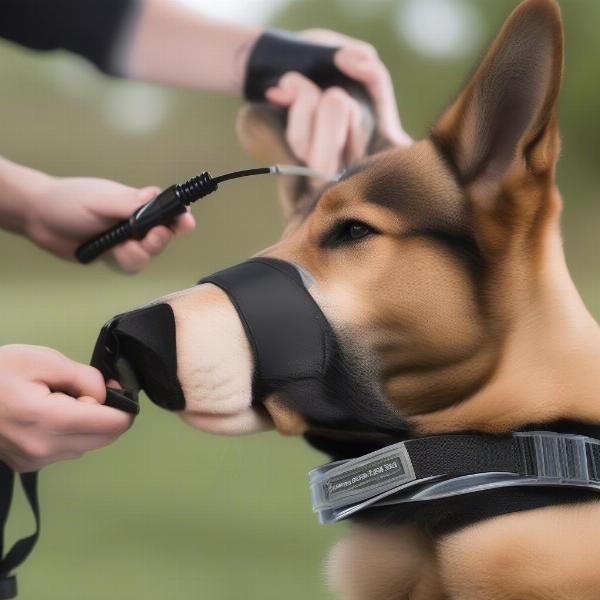Finding the best bark collar for your large dog can be a daunting task. With so many options available, it’s hard to know which one is right for your furry friend. This guide will explore the different types of bark collars, factors to consider when choosing one, and some of the best bark collars on the market for large breeds. We’ll also discuss training techniques and address common concerns about bark collars.
Types of Bark Collars
Bark collars utilize various methods to deter excessive barking. Understanding these different types is crucial for choosing the right one for your large dog.
- Citronella Spray Collars: These collars release a harmless spray of citronella when your dog barks. The scent disrupts the barking behavior without causing any pain or discomfort.
- Vibration Collars: These collars emit a vibration when your dog barks. The sensation is surprising enough to interrupt the barking, but not painful.
- Ultrasonic Collars: These collars emit a high-pitched sound that only dogs can hear when they bark. The unpleasant sound discourages the barking behavior.
- Static Shock Collars (E-collars): These collars deliver a mild static shock when your dog barks. While controversial, they can be effective for persistent barkers when used responsibly and under the guidance of a professional trainer.
 Citronella Spray Collar for Large Dog
Citronella Spray Collar for Large Dog
Choosing the Right Bark Collar for Your Large Dog
When choosing a bark collar for your large dog, several factors should be considered.
- Size and Breed: Ensure the collar fits your dog’s neck comfortably and securely. Large breeds require collars designed specifically for their size and weight.
- Temperament: Consider your dog’s sensitivity. A more sensitive dog might respond well to vibration or citronella, while a more stubborn barker may require a static shock collar (used responsibly and with professional guidance).
- Barking Trigger: Identify what triggers your dog’s barking. Is it boredom, anxiety, or territoriality? Addressing the underlying cause is crucial, and a bark collar should be used as a training tool, not a permanent solution.
- Safety Features: Look for collars with automatic shut-off features to prevent over-correction. Adjustable sensitivity levels are also important to customize the correction to your dog’s individual needs.
Recommended Bark Collars for Large Dogs
While specific product recommendations are subject to change based on market availability and advancements, focusing on reputable brands with safety features and adjustable settings is key. Look for collars with positive reviews and recommendations from professional trainers.
Training with a Bark Collar
A bark collar is a training tool, not a magic solution. It should be used in conjunction with positive reinforcement training methods to address the underlying cause of the barking. Consistency and patience are key.
- Introduce the Collar Gradually: Let your dog get used to wearing the collar before activating it.
- Positive Reinforcement: Reward your dog for quiet behavior with treats and praise.
- Consult a Professional: If you are unsure how to use a bark collar effectively, consult a certified dog trainer.
Are Bark Collars Cruel?
When used responsibly and humanely, bark collars are not cruel. However, improper use can cause distress and anxiety. Choosing the right type of collar, using it correctly, and addressing the underlying cause of the barking are essential. Never use a bark collar as a substitute for proper training and attention.
Conclusion
Choosing the best bark collar for your large dog requires careful consideration of your dog’s individual needs and temperament. Remember that a bark collar should be used as a training tool, not a permanent fix. Combining the right collar with positive reinforcement training and addressing the underlying cause of the barking is the most effective approach to managing excessive barking and ensuring your dog’s well-being. Remember to always prioritize your dog’s safety and comfort.
FAQ
- What is the most humane bark collar for a large dog? Citronella or vibration collars are generally considered the most humane options for large dogs.
- Can bark collars be used on puppies? It’s generally not recommended to use bark collars on puppies younger than six months old.
- How do I choose the right size bark collar for my large dog? Measure your dog’s neck circumference and choose a collar that fits comfortably and securely.
- Are bark collars effective for all types of barking? Bark collars can be effective for various types of barking, but it’s essential to address the underlying cause of the barking.
- Can I leave a bark collar on my dog all the time? No, bark collars should not be left on your dog for extended periods, especially when unsupervised.
- What should I do if my dog’s barking doesn’t improve with a bark collar? Consult a certified dog trainer or veterinarian for further guidance.
- Are there any alternatives to bark collars? Yes, alternatives include training techniques like desensitization and counter-conditioning, as well as addressing underlying anxieties or boredom.
dog friendly accommodation nelson
how much are shock collars for dogs
dog e collar uk
dog friendly hotels in lincoln
ILM Dog is a leading international website dedicated to providing expert advice on dog care and training. We offer a comprehensive range of resources, covering everything from breed selection and health care to nutrition and behavior. Our expert advice on choosing the right products and accessories, like bark collars, will help you provide the best possible care for your furry friend. For personalized advice, contact us at [email protected] or +44 20-3965-8624. Visit ILM Dog for more information.